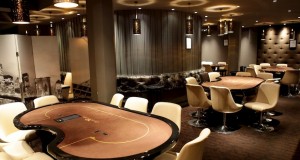 I’m currently reading an excellent book titled “Knights of the Green Cloth: The Saga of the Frontier Gamblers” by Robert K. DeArment, and just as when I read James McManus’s “Cowboys Full: The Story of Poker” I find myself comparing poker’s past with its present, and inevitably its potential future.
I’m currently reading an excellent book titled “Knights of the Green Cloth: The Saga of the Frontier Gamblers” by Robert K. DeArment, and just as when I read James McManus’s “Cowboys Full: The Story of Poker” I find myself comparing poker’s past with its present, and inevitably its potential future.
When you look at poker from a historical perspective you will find isolated periods of plenty. Contrary to what many people think, there are plenty of short-lived periods like the Poker Boom from 2003-2006ish, and like the players of today, old frontier gamblers often had to travel to the new “poker hotspot.”
I’m sure the gamblers plying the tables in San Francisco in 1850 felt their good fortune it was going to last forever (instead it only lasted to about 1856), and when they ended up in the Boomtowns of the Midwest after the Civil War I’m sure they felt they had found their poker Nirvana. And before them the river boat gamblers travelling up and down the Mississippi in the 1830’s probably thought they had a lifelong income.
The point of this little musing is that poker has historically experienced booms and busts; times of acceptance and temperance; times of great wealth and times of poverty. So it sometimes annoys me that many in the poker world try to recreate the 2003-2006 Poker Boom, because history says there will be another Boom period, but it will likely be a little different.
That being said, there are always certain similarities.
Dissecting the Internet Poker Boom historically
Throughout history, poker and gambling were always considered social activities, often paired with booze, women, music and nightlife. Professional gamblers realized this, and for the most part have been what I’ll call atmosphere enhancers.
Furthermore, and some probably won’t like this, poker has always boomed wherever you have a collection of young men where the difference between being flush with cash greatly outweighed being dead broke. Nowadays it doesn’t necessarily have to be young men, but youth is still quite important.
Gambling, and poker were/are seen as a willingness to test your luck against the house was a way to flaunt your dominance, your machismo, and to gain social acceptance and court the ladies. It was not much different than walking into a nightclub today and buying an overpriced bottle of Grey Goose and a VIP table, even if it cost you your entire paycheck to do so. In the end, the experience you might have will make it worth it and this is the thinking of the young, as the older you get the more responsibilities you tend to have.
Even the Internet Poker Boom had this element. We all remember the Ship it Holla Balla stories, and the willingness of many Internet hotshots to toss their money around indiscriminately in what was little more than a display of machismo.
Yes, Internet poker was an isolated activity, but a prime motivator to engage in it was social acceptance.
Furthermore, most people who got into Internet poker didn’t do so because they wanted to play online poker for a living, they took up the game online out of necessity and convenience, there real goal was to get on TV and win the World Series of Poker.
What we can do and look for to usher in another Boom
So what are the main ingredients for a Poker Boom?
The key ingredient is the availability of poker in a new locale. In the modern world, where everyone is connected this is much easier to accomplice, but as U.S. players have come to realize, it sometimes means pulling up your stakes and moving to friendlier gaming locales.
But you’ll also need, a thriving social scene centered around live gambling; a period of affluence (read: not a recession); and a period of gambling acceptance.
As the economy continues to recover, and as legalized online gambling (as well as expanded brick & mortar gambling) spreads we should have the perfect recipe for another poker boom.
The one thing that is lacking is acceptance; we have to once again make poker acceptable to the masses just as it was in 2003 when the entire world became enamored with the game. It’s acceptance (or a lack thereof) that has often ended Poker Booms throughout the years, and this is still true today.
Events like UIGEA and Black Friday (as well as the economic recession) cooled off the public’s romance with poker in recent times, kicking it back into the category of “gambling,” and now it is up to us, the poker world, to rekindle this acceptance for gambling.
If poker’s past has taught us anything, it’s that we should have anticipated UIGEA and Black Friday. Perhaps when the next Poker Boom hits we will be more diligent and proactive in countering any temperance movement that forms.
100% up to $3,000 Bonus
Bovada is our most recommended ONLINE CASINO and POKER ROOM for US players with excellent deposit options. Get your 100% signup bonus today.


Leave a Reply
You must be logged in to post a comment.